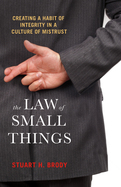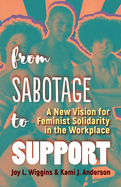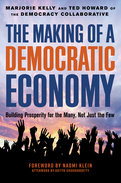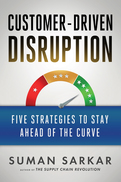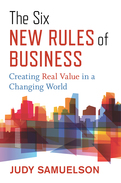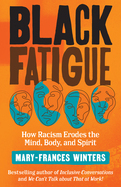Search Results: "Social Venture Networks/books/marketing-that-matters.htm"
Results 277-282 of 361
We are living in a time when dishonesty and duplicity are common in our public institutions, our workplaces, and even in our personal relationships. But by recognizing and resisting the small, seemingly inconsequential ways we make moral compromises in our own lives, we can repair the tear in our social and moral fabric.
The Law of Small Things begins with an IQ (Integrity Quotient) test designed to reveal the casual way we regard our promises and the misconceptions we have about acting truthfully. The book shows how most people believe that integrity is something we “just have” and that we just do, like a Nike commercial. It depicts these and other deceptions we deploy to appear to act with integrity without actually doing so.
The Law of Small Things also exposes how our culture encourages breaches of integrity through an array of “permitted promise-breaking,” a language of clichés that equates self-interest with duty, and the “illusion of inconsequence” that excuses small breaches with the breezy confidence that we can fulfill integrity when it counts.
Brody challenges the prevailing notion that integrity is a possession you hold permanently. No one “has integrity” and no one is perfect in practicing it. What we have is the opportunity to uphold promises and fulfill duties in each situation that faces us, large and small. Integrity is a practice and a habit of keeping promises, the ones we make explicitly and the ones that are implied in all our relationships.
Ultimately, developing skill in the practice of integrity leads us to knowledge of who we are--not in the way the culture defines us, but in the way we truly know ourselves to be.
The Law of Small Things begins with an IQ (Integrity Quotient) test designed to reveal the casual way we regard our promises and the misconceptions we have about acting truthfully. The book shows how most people believe that integrity is something we “just have” and that we just do, like a Nike commercial. It depicts these and other deceptions we deploy to appear to act with integrity without actually doing so.
The Law of Small Things also exposes how our culture encourages breaches of integrity through an array of “permitted promise-breaking,” a language of clichés that equates self-interest with duty, and the “illusion of inconsequence” that excuses small breaches with the breezy confidence that we can fulfill integrity when it counts.
Brody challenges the prevailing notion that integrity is a possession you hold permanently. No one “has integrity” and no one is perfect in practicing it. What we have is the opportunity to uphold promises and fulfill duties in each situation that faces us, large and small. Integrity is a practice and a habit of keeping promises, the ones we make explicitly and the ones that are implied in all our relationships.
Ultimately, developing skill in the practice of integrity leads us to knowledge of who we are--not in the way the culture defines us, but in the way we truly know ourselves to be.
Women are acculturated within systems that encourage them to sabotage one another; this book shows how they can break free of this cultural programming and use whatever privilege and power they have to raise each other up.
Joy Wiggins and Kami Anderson advocate that the only way women can successfully support each other is by addressing the varying intersections of our individual power and privileges, particularly focusing on how some privileges are inherited along lines of race, class, sexuality, and geography. When we fully examine how we have power in certain situations and not in others, we start to see where we can lend privilege to create truly inclusive spaces for the historically underrepresented and marginalized.
Wiggins and Anderson look at how the dynamics of privilege and power have played out in the history of the feminist movement and identify and break down socialized behaviors and ideologies that trigger implicit bias and microaggressions. And they provide tools to interrupt negative thoughts and actions so women can nurture mutual support and show up as their authentic selves. Each chapter features a dialogue between them reflecting on how issues of race, privilege, and power have played out in their lives and their friendship.
The system of patriarchy has created an environment for women to knowingly and unknowingly sabotage each other—it is not inherent in women themselves. This book teaches us how to take an active approach to becoming better allies for each other and by so doing improve our world and end the cycle of injustice.
Joy Wiggins and Kami Anderson advocate that the only way women can successfully support each other is by addressing the varying intersections of our individual power and privileges, particularly focusing on how some privileges are inherited along lines of race, class, sexuality, and geography. When we fully examine how we have power in certain situations and not in others, we start to see where we can lend privilege to create truly inclusive spaces for the historically underrepresented and marginalized.
Wiggins and Anderson look at how the dynamics of privilege and power have played out in the history of the feminist movement and identify and break down socialized behaviors and ideologies that trigger implicit bias and microaggressions. And they provide tools to interrupt negative thoughts and actions so women can nurture mutual support and show up as their authentic selves. Each chapter features a dialogue between them reflecting on how issues of race, privilege, and power have played out in their lives and their friendship.
The system of patriarchy has created an environment for women to knowingly and unknowingly sabotage each other—it is not inherent in women themselves. This book teaches us how to take an active approach to becoming better allies for each other and by so doing improve our world and end the cycle of injustice.
Our economy is designed by the 1 percent, for the 1 percent. This book offers a compelling vision of an equitable, ecologically sustainable alternative that meets the essential needs of all people.
We live in a world where twenty-six billionaires own as much wealth as half the planet's population. The extractive economy we live with now enables the financial elite to squeeze out maximum gain for themselves, heedless of damage to people or planet. But Marjorie Kelly and Ted Howard show that there is a new economy emerging focused on helping everyone thrive while respecting planetary boundaries.
At a time when competing political visions are at stake the world over, this book urges a move beyond tinkering at the margins to address the systemic crisis of our economy. Kelly and Howard outline seven principles of what they call a Democratic Economy: community, inclusion, place (keeping wealth local), good work (putting labor before capital), democratized ownership, ethical finance, and sustainability. Each principle is paired with a place putting it into practice: Pine Ridge, Preston, Portland, Cleveland, and more.
This book tells stories not just of activists and grassroots leaders but of the unexpected accomplices of the Democratic Economy. Seeds of a future beyond corporate capitalism and state socialism are being planted in hospital procurement departments, pension fund offices, and even company boardrooms.
The road to a system grounded in community, democracy, and justice remains uncertain. Kelly and Howard help us understand we make this road as we walk it by taking a first step together beyond isolation and despair.
We live in a world where twenty-six billionaires own as much wealth as half the planet's population. The extractive economy we live with now enables the financial elite to squeeze out maximum gain for themselves, heedless of damage to people or planet. But Marjorie Kelly and Ted Howard show that there is a new economy emerging focused on helping everyone thrive while respecting planetary boundaries.
At a time when competing political visions are at stake the world over, this book urges a move beyond tinkering at the margins to address the systemic crisis of our economy. Kelly and Howard outline seven principles of what they call a Democratic Economy: community, inclusion, place (keeping wealth local), good work (putting labor before capital), democratized ownership, ethical finance, and sustainability. Each principle is paired with a place putting it into practice: Pine Ridge, Preston, Portland, Cleveland, and more.
This book tells stories not just of activists and grassroots leaders but of the unexpected accomplices of the Democratic Economy. Seeds of a future beyond corporate capitalism and state socialism are being planted in hospital procurement departments, pension fund offices, and even company boardrooms.
The road to a system grounded in community, democracy, and justice remains uncertain. Kelly and Howard help us understand we make this road as we walk it by taking a first step together beyond isolation and despair.
Businesses worry about new technologies, but customers are the ultimate disruptors—Suman Sarkar offers bold strategies for making sure you understand your customers and keep up with their ever-changing needs.
Disruption—the brutal roiling of markets, the decline of long-established brands and products, and the rise of new upstarts—drives business failure and success. Most people think technology causes disruption, but technology merely enables it. Changing customer needs cause disruptions, and too many businesses get caught unaware.
Suman Sarkar offers proven strategies that will enable any business to stay radically close to its customers and address their evolving needs. He argues that businesses need to focus on existing customers first—research shows they're likely to spend more and are more profitable than new customers. Personalization is becoming important for the newer generations in both developed and developing markets, so Sarkar describes approaches to make them cost-effective. In our era of instant gratification, customers want what they want now—Sarkar explains how you can develop and deliver products and services faster than ever. And since a few bad Yelp reviews, social media posts, or angry tweets from customers can ruin you, Sarkar shows how to proactively make sure the quality of your products and services stays better than that of your competitors.
The key to survival in this era of changing customer needs is to focus on and address them quickly so customers don't switch to the competition. Drawing on his experiences with leading companies worldwide, Sarkar offers five strategies and techniques that will keep you ahead of the curve.
Disruption—the brutal roiling of markets, the decline of long-established brands and products, and the rise of new upstarts—drives business failure and success. Most people think technology causes disruption, but technology merely enables it. Changing customer needs cause disruptions, and too many businesses get caught unaware.
Suman Sarkar offers proven strategies that will enable any business to stay radically close to its customers and address their evolving needs. He argues that businesses need to focus on existing customers first—research shows they're likely to spend more and are more profitable than new customers. Personalization is becoming important for the newer generations in both developed and developing markets, so Sarkar describes approaches to make them cost-effective. In our era of instant gratification, customers want what they want now—Sarkar explains how you can develop and deliver products and services faster than ever. And since a few bad Yelp reviews, social media posts, or angry tweets from customers can ruin you, Sarkar shows how to proactively make sure the quality of your products and services stays better than that of your competitors.
The key to survival in this era of changing customer needs is to focus on and address them quickly so customers don't switch to the competition. Drawing on his experiences with leading companies worldwide, Sarkar offers five strategies and techniques that will keep you ahead of the curve.
The rules of business are changing dramatically. The Aspen Institute's Judy Samuelson describes the profound shifts in attitudes and mindsets that are redefining our notions of what constitutes business success.
Dynamic forces are conspiring to clarify the new rules of real value creation—and to put the old rules to rest. Internet-powered transparency, more powerful worker voice, the decline in importance of capital, and the complexity of global supply chains in the face of planetary limits all define the new landscape. As executive director of the Aspen Institute Business and Society Program, Judy Samuelson has a unique vantage point from which to engage business decision makers and identify the forces that are moving the needle in both boardrooms and business classrooms.
Samuelson lays out how hard-to-measure intangibles like reputation, trust, and loyalty are imposing new ways to assess risk and opportunity in investment and asset management. She argues that “maximizing shareholder value” has never been the sole objective of effective businesses while observing that shareholder theory and the practices that keep it in place continue to lose power in both business and the public square. In our globalized era, she demonstrates how expectations of corporations are set far beyond the company gates—and why employees are both the best allies of the business and the new accountability mechanism, more so than consumers or investors.
Samuelson's new rules offer a powerful guide to how businesses are changing today—and what is needed to succeed in tomorrow's economic and social landscape.
Dynamic forces are conspiring to clarify the new rules of real value creation—and to put the old rules to rest. Internet-powered transparency, more powerful worker voice, the decline in importance of capital, and the complexity of global supply chains in the face of planetary limits all define the new landscape. As executive director of the Aspen Institute Business and Society Program, Judy Samuelson has a unique vantage point from which to engage business decision makers and identify the forces that are moving the needle in both boardrooms and business classrooms.
Samuelson lays out how hard-to-measure intangibles like reputation, trust, and loyalty are imposing new ways to assess risk and opportunity in investment and asset management. She argues that “maximizing shareholder value” has never been the sole objective of effective businesses while observing that shareholder theory and the practices that keep it in place continue to lose power in both business and the public square. In our globalized era, she demonstrates how expectations of corporations are set far beyond the company gates—and why employees are both the best allies of the business and the new accountability mechanism, more so than consumers or investors.
Samuelson's new rules offer a powerful guide to how businesses are changing today—and what is needed to succeed in tomorrow's economic and social landscape.
Black Fatigue
2020
This is the first book to define and explore Black fatigue, the intergenerational impact of systemic racism on the physical and psychological health of Black people—and explain why and how society needs to collectively do more to combat its pernicious effects.
Black people, young and old, are fatigued, says award-winning diversity and inclusion leader Mary-Frances Winters. It is physically, mentally, and emotionally draining to continue to experience inequities and even atrocities, day after day, when justice is a God-given and legislated right. And it is exhausting to have to constantly explain this to white people, even—and especially—well-meaning white people, who fall prey to white fragility and too often are unwittingly complicit in upholding the very systems they say they want dismantled.
This book, designed to illuminate the myriad dire consequences of “living while Black,” came at the urging of Winters's Black friends and colleagues. Winters describes how in every aspect of life—from economics to education, work, criminal justice, and, very importantly, health outcomes—for the most part, the trajectory for Black people is not improving. It is paradoxical that, with all the attention focused over the last fifty years on social justice and diversity and inclusion, little progress has been made in actualizing the vision of an equitable society.
Black people are quite literally sick and tired of being sick and tired. Winters writes that “my hope for this book is that it will provide a comprehensive summary of the consequences of Black fatigue, and awaken activism in those who care about equity and justice—those who care that intergenerational fatigue is tearing at the very core of a whole race of people who are simply asking for what they deserve.”
Black people, young and old, are fatigued, says award-winning diversity and inclusion leader Mary-Frances Winters. It is physically, mentally, and emotionally draining to continue to experience inequities and even atrocities, day after day, when justice is a God-given and legislated right. And it is exhausting to have to constantly explain this to white people, even—and especially—well-meaning white people, who fall prey to white fragility and too often are unwittingly complicit in upholding the very systems they say they want dismantled.
This book, designed to illuminate the myriad dire consequences of “living while Black,” came at the urging of Winters's Black friends and colleagues. Winters describes how in every aspect of life—from economics to education, work, criminal justice, and, very importantly, health outcomes—for the most part, the trajectory for Black people is not improving. It is paradoxical that, with all the attention focused over the last fifty years on social justice and diversity and inclusion, little progress has been made in actualizing the vision of an equitable society.
Black people are quite literally sick and tired of being sick and tired. Winters writes that “my hope for this book is that it will provide a comprehensive summary of the consequences of Black fatigue, and awaken activism in those who care about equity and justice—those who care that intergenerational fatigue is tearing at the very core of a whole race of people who are simply asking for what they deserve.”


